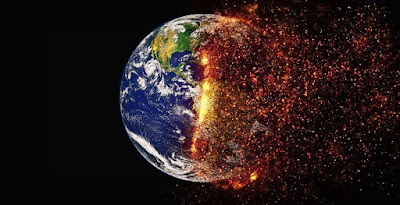The indirect effects of climate change on human rights. Displacement _
The indirect effects of climate change on human rights
Displacement.
The most significant impact in itself of climate change is the migration of people as a result of desertification, drought, storms and floods, leaving their lands and properties, and displacement within their countries, especially in developing countries, where the displaced within their countries face great challenges, especially with regard to their protection.
And securing housing, food, water and livelihoods, and restitution or compensation for the property they lost as a result of their displacement and exposure to sexual violence, in addition to their exposure to forced recruitment, especially displaced children and adolescents, into armed extremist groups, as happened in the Democratic Republic of the Congo and the Republic of Chad as a result of the conflicts that occurred due to the dispute over agricultural land.
Climate refugee.
They are the people who cross the borders to escape hunger, water scarcity and climate fluctuations in search of safety and a decent living, which exposes them to many dangers during their asylum and causes crises to the countries they resort to, where the alarm sounded in a detailed report published by the Center for Policy Analysis Economics at the German University of Potsdam in March 2019 stated (The resulting disasters that occur over long periods of time, such as high heat waves and droughts, will lead to an increase in migration and displacement rates more than disasters that occur suddenly, such as floods and hurricanes.
as he said The former Secretary-General of the International Committee of the Red Cross (Marco Niscala), commenting on the tragic death of about 100 refugees who drowned off the Senegalese coast after sailing towards Spain, “This crisis is met with complete disregard, because no one comes to help these desperate people, but there is no organization that even By compiling the statistics that record this daily tragedy, “most of the people fleeing from hunger because of the climatic changes that swept their poor countries are not allowed to enter the lands of other countries and they are not provided with the necessary protection.”.
On the pretext that they do not hold refugee status in the traditional sense, we find that few of them received the assistance of the governments to which they sought refuge, and many of them did not receive the necessary support, which causes the emergence of cases of looting, robbery and theft, and the matter may develop into murder and affiliation with terrorist groups.
Accordingly, the United Nations Human Rights Committee moved at the beginning of the year 2020 to issue a historic ruling in which it called on the governments of countries to take into account the human rights violations resulting from the climate change crisis when considering the deportation of asylum seekers, stressing that climate change constitutes a threat to the right to life.
From here, we find the great impact of climate change on human rights and the disasters it can cause on humans, which push them to try to find a safe place that guarantees their existence and life, and where food and other resources are available, and thus increase tensions and the possibility of conflicts.

Comments
Post a Comment
Thank you for comment